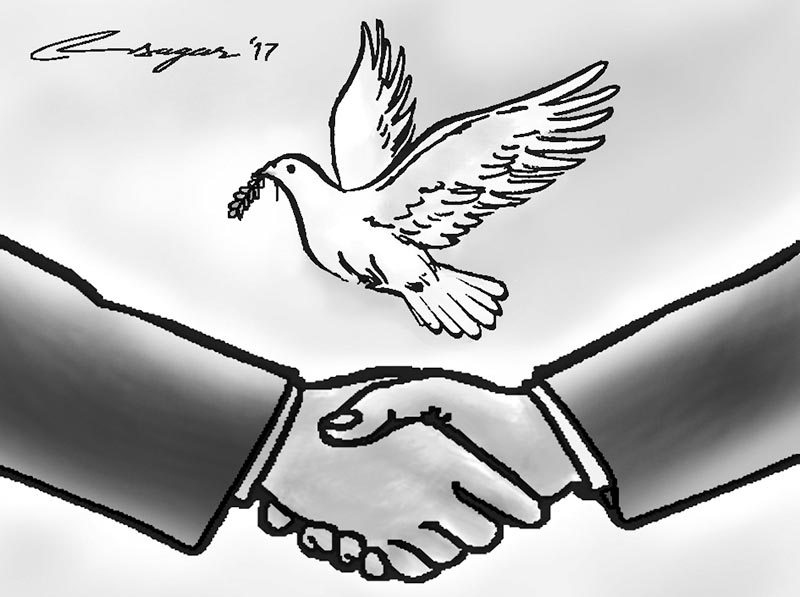International relations: New challenges
Since non-alignment has faced new challenges due to the break of the superpower balance, there is a need to adjust with the new challenges that the changing political needs pose
Every sovereign independent state has its own foreign policy for its national interests and the diplomatic mechanism is deployed accordingly. Generally, the foreign policy of a country includes three things -- the formulation, implementation and projection.
Since mere enunciation and propagation of the ideals of foreign policy will not achieve the national goals, it is essential to realize the reality where the role of diplomacy comes into the picture. An efficient diplomatic machinery of the nation will be an important instrument to pursue it. In fact, diplomacy is considered as a means planned to achieve the objectives of foreign policy. The diplomatic wing or the Foreign Ministry plays a significant role in dealing with the outside world.
In reality, Nepal has steadfastly adopted a non-aligned foreign policy since about three centuries ago. The founder of the nation, late King Prithvi Narayan Shah the Great, had described the geographical situation of Nepal as a yam between two boulders,’ referring to the two big neighbors of Nepal - China and India.
The visionary king had also said it was important for the county to keep a balanced relationship with these two huge neighbors. Nepal has followed this well-trodden path in its foreign policy.
After the country opened its doors to democracy and modernization about seven decades ago, this practice of a non-partisan foreign policy, which started to be called the “non-aligned foreign policy”, became more important. That was the period after World War II when the world was divided into two major groups headed by the two super powers — the United States of America and the erstwhile Union of Soviet Socialist Republics. Since the past few decades Nepal has been striving to push its foreign policy beyond India and China in accordance with its national interests of expanding Nepal’s independent role.
Since 1947, Nepal has entered into international politics and since then it has taken keen interest in world affairs and has become a leading member of the non-aligned movement.
Today, it is an active participant nation in the United Nations (UN) peace-keeping operation. Its role in the UN Security Council and other meetings has also been admirable and fruitful.
Time and again, Nepal has expressed its opinions on the principles of the United Nations and non-alignment. However, it has differed with the superpowers and the non-aligned states on issues that had affected the peace and security in different regions of the world.
Nepal’s foreign policy is motivated by the school of idealism which has helped it to play an active role in world affairs and in the United Nations.
Actually, its active participation in the United Nations peace-keeping activities is recognition of small nations’ utilities in the peace-keeping role. Also, in the issues of disarmament, arms control, decolonization process, north-south dialogue, south-south co-operation, landlocked states’ problems, there is independence of thinking and policy articulation. Being a founding member of the nonaligned movement, Nepalese kings and leaders have often participated in its development.
The old foreign policy paradigms are affecting a shift to suit new requirements. In the new circumstances, economic diplomacy has become a catchword in diplomatic circles. It also seems to mean a major departure from the political thrust that diplomatic activities got during the cold war era; however, it does not mean sweeping the political problems under the carpet.
Political and economic interests of a country are interrelated. In fact, there can be no economic diplomacy if it lacks correct political orientation.
Eco-politics also plays a vital role in strengthening international relations. New eco-political concerns and related issues are access to natural resources, international affairs, future world food supplies, questions of social justice and human rights, new economic development problems for less developed countries and the equitable and efficient distribution of world services.
Although a strategy for survival has been a major focus in the Nepalese foreign policy during its whole post-unification history, the economy is not a new ingredient in Nepal’s foreign policy.
However, Nepal’s diplomatic initiatives have not been able to bring much economic benefits to the Nepalese people as desired.
The important feature of the modern phase of Nepal’s foreign policy is growing intellectualization which in earlier eras played a little role in the formulation, conduct and interpretation of foreign policy. Intellectualism, which is a disposable commodity in all traditional societies, is least developed in Nepal and so more readily dispensable.
Nepal’s relationship with the external world contains at its core profound ethical and cultural concerns. Inadequate attention paid to realize this dimension of adjustment has the effects of narrowing options to Nepal.
To strengthen international relations, there should be an improvement of ties with neighbors and with other countries based on the non-aligned policy. Since non-alignment has faced new challenges due to the break of the superpower balance, there is a need to adjust with the new challenges that the changing political needs pose.






